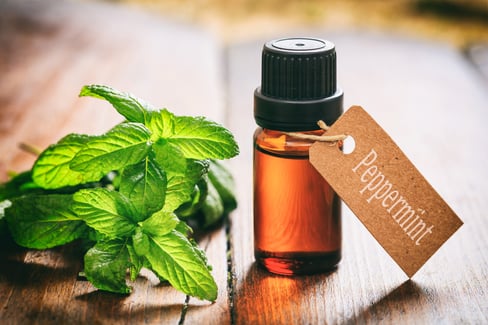 Peppermint oil is a commonly used nutrition remedy for Irritable Bowel Syndrome (IBS), other digestive problems (abdominal pain), the common cold, and headaches. We will focus on gut health in this blog. This remedy has been mentioned in records from ancient Greece, Rome, and Egypt and is becoming more popular in the modern age.
Peppermint oil is a commonly used nutrition remedy for Irritable Bowel Syndrome (IBS), other digestive problems (abdominal pain), the common cold, and headaches. We will focus on gut health in this blog. This remedy has been mentioned in records from ancient Greece, Rome, and Egypt and is becoming more popular in the modern age.
It is suggested that peppermint oil in enteric-coated capsules may improve IBS-related symptoms, such as abdominal pain. A meta-analysis evaluated 726 patients across nine studies, all of which were assessing the use of peppermint oil for treatment of IBS. All the studies showed a significant improvement in IBS symptoms and abdominal pain. The only adverse effect commonly noted was heartburn. Furthermore, another study was done where 65 IBS patients completed the study. There was a placebo group and a group treated with peppermint oil. Over the course of six weeks, those taking peppermint oil said abdominal pain (upset stomach, bloating, and gas) markedly improved, whereas the placebo group saw no significant changes. No other IBS symptoms improved. Two weeks after trials ended, the pain score increased back to the normal (same report as prior to treatment).
Drug Interactions and Additive Effects
According to the literature, the most common drug interaction is enteric-coated peppermint oil capsules taken at the same time as antacids. It is suggested that the two not be taken together, because the enteric coating will be broken down too quickly, which can result in heartburn.
Side Effects
Peppermint oil has been recognized as safe. Possible side effects associated with peppermint oil include allergic reaction and heartburn. The most common side effect associated with peppermint oil supplementation is heartburn, especially among those with IBS.
The Clinical Bottom Line
A significant amount of research shows that peppermint oil supplementation in those with IBS helps reduce abdominal pain. Additionally, it is safe. I would suggest someone struggling with IBS take peppermint oil. However, if they begin to experience excessive heartburn, I would suggest not taking peppermint oil or making sure they are not taking it with an antacid. Furthermore, it is important to remember that peppermint leaf is NOT the same thing as peppermint oil. Peppermint oil is going to be more concentrated and has the research to back up the benefits. On the contrary, peppermint leaf will be less toxic and does not have the research to support usage.
Further Research
Much of the research done to prove peppermint oil helps with IBS was short term. Not many studies have looked into the long-term effects and safety of supplementing peppermint oil. Thus, I believe future research should look into that.
This blog was written by Sabrina Goshen, NIFS Registered Dietitian. To learn more about the NIFS bloggers, click here.

